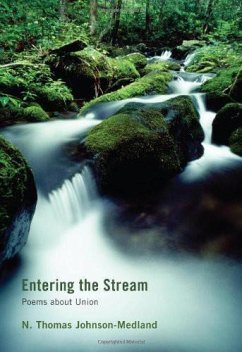The notion and phrase of "entering the stream" has long been an image for merger and union. Most often it is meant to sum up the idea of union with the Divine Principle or God. Less often, yet still common, it is used to image the union of ideas, bodies, and movements. The sense that one thing folds into or flows into another and gets lost is still a major underpinning toward the belief that there is some "ah ha" moment in life where we are able to drift out of simple, commonplace existence and enter the field of ALL knowing. We believe that there can be and is a moment of merger (a born-again instant), an awakening to something outside of what it means to be singularly dual. It is not by chance that the two sacramental rites within Christianity that have the deepest roots in the gathered community over time--reaching down into the loam of our existence--are Baptism and Eucharist. The first--the initiation rite--is about dissolving into God and His mercy and forgiveness. We enter into Him and the fullness of His Kingdom. We are overwhelmed by the waters and emerge a new creature. The second--the continuation rite--is about God dissolving into us. He enters us bringing the fullness of His Kingdom. We ingest God (depending upon your theology) in either image or fact and we emerge a new creature. The poems that follow are about this "axis of consumption," this "axis of dissolving" in our lives. We are swallowed up by God. We swallow up God.
Dieser Download kann aus rechtlichen Gründen nur mit Rechnungsadresse in A, D ausgeliefert werden.


